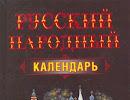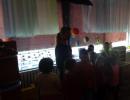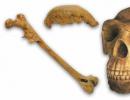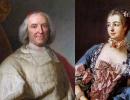“Whoever is literate is not abyss” - Naum Literacy Day. Project on the Russian language "he who is literate is not lost"
Sections: elementary School
- introduce students to consonant sounds [g-g] and letters G, g;
- exercise students in reading syllables and words with a new letter;
- continue the formation of conscious reading skills, develop phonemic hearing, speech, memory, logical thinking;
- expand the horizons and vocabulary of students;
- to cultivate a sense of respect for nature, a sense of responsible attitude to one's health.
Equipment: subject pictures: mushrooms, baskets, birds, a steam locomotive, magnetic letters, red and black squares, handouts, caps for playing, phono-chrestomathy, cards with words, a map of the Kemerovo region, a proverb, V. Dragunsky's story “Before going to bed”.
During the classes.
I. Organizational moment.
Let's say in unison:
"We are intelligent!
We are friendly!
We are careful!
We are diligent!
We are great at learning!
Everything will work out for us!”
II. Working on new material.
1. Attention exercise.
Equipment:
students have individual cards
at the teacher - on the blackboard
1) remember the location of the letters;
2) restore this order on individual sheets.
Self-test: the teacher shows the letters, the students check.
Conclusion: we will be attentive in the lesson.
2. Actualization of knowledge.
Which letter is missing? (I)
- Prove it. (vowel among consonants)
Letter I closed with a red square.
Which letter is missing from the rest? (to)
- Prove it.
Letter to closes black square.
How are the remaining letters similar? (All consonants, denote voiced sounds, all paired consonants)
Task: name pairs of consonants according to deafness-voicedness (d-t, b-p, s-s)
Teacher: - Today at the lesson we continue to learn to read, think, reason.
3 . Extraction of sounds. Introduction to letters.
Look around, we are in a mushroom field, mushrooms are everywhere. Who knows the riddle about mushrooms? (Children talking)
- We have a common basket, go, “collect” the mushrooms, put them in the basket.
Students walk around the classroom, picking mushrooms in a basket. Then they take their seats.
Task: draw a diagram of the word "mushrooms"
Students have a set of handouts. Work is in progress in pairs: drawing up a diagram of the word “mushrooms”.
Word analysis.
Task: highlight the first sound, give a description
And how will this sound sound softly?
What letter writes these two sounds?
Task: to find the letters G with the eyes. (Children turn around, look for letters hidden in the classroom).
Why is the letter half blue, half green? (Denotes both hard and soft sounds)
4. Drawing a letter on paper point by point.
5. Reading syllables, words.
a) ha go goo goo goo goo goo goo goo goo goo goo goo goo goo goo
b) - We collected full baskets of mushrooms. Which mushrooms have the [g] sound in their names?
BRUSHES need to be looked for carefully, because. often they hide under the foliage. Very tasty in pickle.
I introduce you to another mushroom with the sound [g]: TALKERS. These are edible mushrooms. They can be fried, salted, marinated.
What is a person who picks mushrooms called? MUSHROOMER
- Tell me how to pick mushrooms.
- What kind of mushrooms with the sound [g] do not belong in a basket? ( toadstools- poisonous mushrooms
- But you don’t need to shoot them down either, just go around if you meet them.
- Where do mushrooms grow? (In the woods)
- What is the name of a dense impenetrable forest? TAIGA
- More than half of the territory of our Kemerovo region is occupied by taiga.
This train will take us to the taiga, and we will take a look at the life of the inhabitants of the forest with one eye.
Drawing of a steam locomotive. Cars to it: on the first car the letter G, on the second car - RUST, on the third - OROD, on the fourth - RACH.
Task: attach wagons to the locomotive, read the resulting words.
c) Vocabulary work.
SADNESS
Task: name the word opposite in meaning. (Fun)
Teacher: Fun, joy, laughter are good medicine, they help from any illness. Joy makes a person happy. When a person is happy, he is able to see the beauty and goodness in life, and give them to others. We will not be sad at the lesson. Smile, give smiles to each other and to me.
What city do we live in? (In Novokuznetsk)
- Tell me, what is he? (Big, beautiful, hospitable, etc.)
- We're leaving town. We arrive in the forest.
PHYSMINUTE.
There is a hut in the dark forest
Stands backwards.
In that hut there is an old woman -
Grandmother Yaga lives.
Crochet nose, big eyes,
Like embers are burning.
Wow, what an angry -
Hair stands on end!
What other birds do you know that have the sound [g] in their names? (Capercaillie, jackdaw, goose, dove)
- Rook is of great benefit, destroying harmful insects in fields and meadows. He is from the raven squad, looks like a crow and cries like that.
Phonochrestomatia - the cry of a rook.
Peace bird. There is such a legend. When the main God Zeus was going to war, he found a dove and her chicks in his helmet. Zeus did not destroy the nesting place and postponed the war.
The wagons of the locomotive are overturning. It turns out the word
LITERATURE
What kind of person is considered literate?
- Do you think it is difficult to become literate?
- What should be done for this?
6. Reading by the teacher of the story of V. Dragunsky “Before going to bed”.
What is a scientist called? (Educated)
WHO IS GOOD TO LITERATURE, THAT WILL NOT BE DISAPPEARED.
How do you understand the meaning of the saying?
7. Work on the text.
a) Primary reading of the text by the teacher.
The fox has sharp teeth, a thin stigma; ears on the top of his head, a warm coat, a vest on his chest, and not a white tie on his neck.
The fox walks quietly, bends down to the ground; wears his fluffy tail carefully; looks kindly, smiles.
The robber fox loves hens, loves ducks, will twist the neck of a goose, and will not have mercy on a rabbit.
According to Ushinsky
How would you name the text?
b) Reading the text by students with the task.
Task: underline the words that the author calls the fox
Checking: reading the text aloud, completing the task.
What is another name for a fox in fairy tales?
Generalization: the fox lives in the forests of our region. Leaving the chase, the fox confuses the tracks and “thinks up” all sorts of tricks to deceive the dogs.
What other animals of our forests do you know?
8. The game "Shadow-shadow-sweat".
Equipment: caps with the image of a fox, a hare, hedgehogs, a bear.
Children sing and act.
Shade-shade sweat
Above the city is a wattle fence.
The animals sat under the wattle fence,
Boasted all day.
The fox boasted:
“I am beautiful to the whole world”
The bear boasted:
“I can sing songs”
Hedgehogs boasted:
“We have good coats”
Bunny boasted:
"Come, catch up."
III. Summary of the lesson. Reflection.
On International Literacy Day in the children's library. A.P. Gaidar held the action "City with a book".
In the morning, fourth-graders of school No. 24 named after V.I. I.S. Turgenev. The festive program "Let's read, let's play, let's spend time with benefit" was fun and interesting. Valentina Ivanovna read her poems, made riddles, played games with the guys. Fourth-graders read many of her poems aloud with pleasure. Then she introduced the children to her new poems from future children's collection.The schoolchildren liked the poems.
At 12 o'clock for the fourth-graders of Lyceum No. 22, an educational and game program "Visiting the Literate" was held.
First, the leading librarian Savitskaya Svetlana Vladimirovna told the schoolchildren about the books presented at the exhibitions “Russian language is excellent”, “Visiting a Gramotey” and “Who is literate, he will not be lost”. Svetlana Vladimirovna introduced the schoolchildren to interesting facts with words in Russian. The guys learned that the only one-syllable adjective in Russian is evil; that only 3 native Russian words begin with the letter "A": az, alphabet, maybe; that almost all words where there is a letter "F" are borrowed. A.S. Pushkin was very proud that in his "The Tale of Tsar Saltan" the letter "F" is found in just one word "Fleet". And in the phrase "Eat more of these soft French rolls and drink tea" all the letters of the Russian language are collected.
Then the children played literary games, guessed riddles, solved crossword puzzles, and most importantly, read aloud excerpts from famous works displayed at book exhibitions in the reading room.
At the end of the program, fourth-graders actively participated in the Talking Bookmark mini-action, the results of which were summed up at the end of the day. The action was attended by two classes that participated in the events, as well as library readers. 15 books by different children's authors were presented at the exhibition for the action. The books were chosen by the children themselves, who came to the library a week before the voting.
Summing up the results of the action, we were pleasantly surprised that A. Gaidar's book "Timur and his team" took the first place - 25 votes. In second place is E. Uspensky's book "Holidays in Prostokvashino" - 19 votes. In third place is A. Volkov's book "The Wizard of the Emerald City" - 17 votes.
Fiction is a model of life. It contains many examples of good, well-mannered heroes that children want to be like. Getting acquainted with classical works, the child develops his speech, enriches it with new words. The process of reading brings up perseverance, attentiveness, and the ability to empathize in a small reader.
International Literacy Day is celebrated on the same day, September 8th. There is symbolism in this, since journalism is the profession of a literate person, a writing person. But also - a person responsible for his knowledge, for his word.
Sometimes - life, like the Czech Julius Fucik, who was executed "for his profession" on this September day in 1943 (In honor of his tragic death, this memorable Day was established.) We also know the names of modern history - Vlad Listyev, Paul Khlebnikov, Anna Politkovskaya, Georgy Gongadze... And for how many journalists "hot spots" become the last points in their lives!
In 2006, International Literacy Day was celebrated for the 40th time. Koïchiro Matsuura, Director-General of UNESCO (the organization that founded Literacy Day), emphasizes: "Literacy is not only important in itself, it is also, by all accounts, one of the most important factors in development. That is why the underestimation of this role is of great concern." According to him, literacy is also "a lever for change and a means of promoting the development of society."
It's hard not to agree. And for residents, in particular, Ukraine, this is becoming extremely relevant. Because it is easier to manage people who lose their literacy like a herd. This was pointed out by the ancient Chinese Confucius. In the absence of education and the ability for critical analysis, with historical forgetfulness, the people easily trust any rogues, any false leaders acting in the style of sectarian preachers. Yesterday they said one thing, today another, they lie, fluffing out beautiful eyelashes or rolling out "honest" eyes, and surprisingly easily "push" any "noodles on the ears" to the illiterate.
However, we had ancestors from whom it is worth taking an example strictly. Old Russian chroniclers speak, for example, of the wisdom of the Russian prince Yaroslav, beginning with the "praise of books" placed under the year 1037 in the Tale of Bygone Years. Likening the prince to the Old Testament Solomon, the chroniclers argue that Yaroslav is wise because he built the churches of Hagia Sophia in Kyiv and Novgorod, that is, he dedicated the main churches of the cities of Sophia - the wisdom of God, to which the main church of Constantinople was dedicated.
Our ancestors knew the value of literacy and wisdom. It is no coincidence that Yaroslav the Wise began to be revered by Christians immediately after his death; for the first time as a saint, he is mentioned by Adam of Bremen, who in the "Acts of the High Priests of the Hamburg Church", dated 1075, he calls the Grand Duke Yaroslav Vladimirovich a saint. (Yaroslav the Wise was not formally included among the saints of the Russian Orthodox Church, and only on March 9, 2004, in connection with the 950th anniversary of his death, was he included in the calendar of the Ukrainian Orthodox Church of the MP, and on December 8, 2005, with the blessing of His Holiness Patriarch Alexy II, February 20 / March 5 was included in the calendar as the day of commemoration of the Blessed Prince Yaroslav the Wise.)
Our ancestors were sharp and sharp-witted, saying: "More literate, fewer fools." But we seem to be in no hurry to fulfill their precepts. We rush into all serious, easily tearing away our own conquests. But we had the strongest educational system in the world! But we - blood from the nose - want to be in Europe! Or - "like Europe". Very doubtful. Rather, we will lose our own, and we will not find someone else's. Anyone who has tried to comprehend the situation with the level of literacy of today's young citizens of Ukraine understands that the current gold medalists and red diploma holders, despite the fact that they are crowned with European-style certificates (in accordance with the Bologna Agreement), are inferior in terms of the level of education to the solid C students of the 70-80s of the Soviet years. The transition to formalized testing, the exclusion, say, of essays in literature or history from exams (the teaching of history is generally a separate conversation) - caused obvious damage (recoverable?) to our general literacy, the ability of young citizens to think independently. Bracketing the Russian language, classifying it as "foreign" (and Russian literature as "foreign") has dealt and continues to deal the final blows to general education. It seems that it is beneficial for someone to turn our country into a common farm. Well, a poorly educated person can somehow cope with an apiary, we have vivid examples, but what about modern technologies, with the management of such a huge country as Ukraine?
A Ukrainian proverb, generously presented to us in his instructive collection by Volodymyr Dal from Lugansk, says: "Send a bad one, and then another." There is also such a "purely Russian" variant: "Send Ivan, follow Ivan a fool, follow a fool still a fool, so go there yourself!" That is, AFTER THE FOOL, EVERYTHING WILL HAVE TO BE REDOED EVERYTHING! You read and see in this picture many Ukrainian unfortunate politicians. This is what our wise people said about them: They are clearly visible, as in the palm of your hand, these current writers of wise decrees. The pen creaks, the paper is silent. The tongue is stagnant, but the pen is not shy. Now you read another decree, and after it a second, third, fourth, and how can you not remember: "The book, and in it the fig and the fig."
You look at another schismatic, but again Dahl will tell you: "The priest has got a letter."
So, dear fellow citizens, let's not be diplomas (which are now bought, like exams - "as if frolicking and playing"), but truly literate, because learning is light, and ignorance is darkness.
And, again, we should not forget what is appropriate on the eve of elections - even to the Rada, even to the Duma: "Send the fool, but follow yourself!" See who is working, and who is only scratching and devastation with his tongue, sowing discord.
Understand literacy!
Harkov city
In the photo: a monument to Yaroslav the Wise at the National Law Academy in Kharkov. Author's photo
Reading to learn is always (forward) useful.
Who is much more literate, that will not be an abyss.
More smart people, less fools.
Not foldable petition warehouse, foldable decree (meaning).
Not foldable (not red) in writing, foldable (red) in fiction.
The book is not red in writing, it is red in mind.
He studied with copper money.
We, the poor, study for copper, and the rich for rubles.
They cut off the head, took out the heart, give it to drink, tell it to speak (pen).
I’ll cut off my head, I’ll take out my heart, I’ll give it to drink, it will speak (the same).
Fluffy on top, sharp on the bottom, stick it in - dry, take it out - wet (same).
The little ones are small, but the wise path seems (the same).
Born of flesh, but no blood; I don’t know how to read and write, but I’ve been writing for a century (the same).
The seed is flat, the field is smooth, whoever knows how, he sows; the seed does not sprout, but bears fruit (letter).
A white cloth is spread around the yard: a horse tramples it, one walks, another leads, black birds sit on it (the same).
The earth is white, the seeds are black: five plow, two watch over, one governs (the man who writes).
The field is white, the seed is black, whoever sows it understands (letter).
Neither heaven nor earth is white: two look, three work, one commands (the same).
Neither heaven nor earth is white in vision; three walk on it, one is driven; two peep, one commands (paper, fingers, pen, eyes, mind).
Doesn't eat and vomits; and what he vomits up, again gobbles up (sandbox).
In Moscow they chop, but here (and to us) chips fly (letters, newspapers).
In the forest (in St. Petersburg, in Moscow, in the city), firewood is chopped, and chips fly towards us (and in all cities, villages) (the same).
Neither a man nor a woman walks, carries neither a pie nor a fold (letter).
The ambassador is like fur: what you put into it, then it carries.
A smart ambassador has no great mandate, but do not be lazy to follow a stupid ambassador, go yourself.
Fool gone, but go follow yourself!
Send a bad one, and after him another (Little Russian).
Send him, and follow him yourself!
Send Ivan, follow Ivan the fool, follow the fool another fool, so go there yourself!
Seven went, but go after yourself!
Than to send seven, to visit yourself.
Not to shoe a cat, but to send for you (if everyone is gone).
It is good to send him for death.
Vavilo left on a reel, yes, apparently, he was crushed by the forest.
The ambassador left and drowned in the brine.
If he does not strangle himself, then he will come back.
A bow that is a king, arrows that are messengers.
By embassy and honor. According to the embassy, they keep the answer.
The ambassador is neither executed nor cut down. The ambassador is neither forged nor knitted.
The ambassador is neither flogged nor cut down, but only favored.
Whose ambassador, that (that) and honor (and honor).
Nikola has two schools: they teach the alphabet and recite eve.
Without a warehouse in warehouses, to no avail in rumors.
In warehouses, don't be literate.
Reads like a sexton (like a psalter).
They teach the alphabet, they shout in the whole hut.
Fita and Izhitsa - the whip is approaching the lazy.
The alphabet is science, and the guys are beech (flour).
For az yes for beeches, and a pointer in hand.
First, az yes beeches, and then science.
He does not know the letter, but the numeral repeats.
How is he - a horse, beeches erik - a bull, the verb az - an eye.
Er yes er - fell from the mountain, er yes yat - there is no one to pick it up.
According to the letter, he stopped short, the figure was not given.
Books do not play with anklets. In books, not in chocks.
Now there are many literate, but few well-fed.
Plow feather is lighter. A literate person is not a plowman (not a worker).
And he himself is not happy that he is much literate.
The priest got away with a diploma.
A book is a book - a word is a word! Come on, sexton, take her to the altar (about an illiterate priest).
Eco miracle: look - it's clean; if you stroke it, it's smooth, but if you start reading, it hurts everywhere (said the deacon).
Civil letter from the Antichrist.
Everything is a commodity, and rubbish is a commodity, but books are not a commodity (citizen Kankrin said when Smirdin asked for loans for his library).
The book has two sheets, and the middle is empty.
The book, and in it the fig and the fig.
Paper endures, pen writes. The pen creaks, the paper is silent.
The pen is bolder than the tongue. The tongue is stagnant, but the pen is not shy.
You will write with a pen, you will not make fun (you will not cut it out) with an ax.
Written with a pen, do not cut down with an ax.
You will write with a pen that you will not take out with an ox.
Twirls a pen, like a spindle (what the hell is a hook, a tail).
A piece of paper is dragging to the court.
Read, do not fidget, and what is written, do not be angry.
Lying in print. Lies like a newspaper. You can’t lie against the printed (newspaper) one.
You can't say better than printed. Speaks like a book.
This is written with a pitchfork (i.e., in two, incorrectly).
Writes letters, but asks for memos.
According to old memory, that according to literacy. Living letter.
In writing, that in hewn. According to what is written.
The Code reads, but does not know the deeds.
Looks at the book, but sees a fig.
Read a little, but a lot (yes, more) understand!
Written rewritten, the village of Borisovo (he speaks of a letter ignorant of the letter).
This is not written with me (not with us).
Written on a sieve, lined with a towel (illegible).
The paper is not purchased, the letter is homemade.
Makarka wrote with his stub end.
He writes from the wall (from right to left, Jew or Tatar).
Where it was necessary to sneeze - a comma; where it hiccupped - a colon, and where to sniff tobacco - a full stop.
The letter is like chickens have wandered.
Chicken legs, hooks and suckers.
Two jambs with a lintel, two half-wheels, two banners with a wheel, two banners with a hook (rest).
The gibberish letter (any digital letter).
As if poppy sowed (small letter).
He writes as if he is spreading divorces (largely and slowly).
Scribblers wrote, but dogs read.
Wrote a scribbler, and his name is a dog.
It was written by such that the pen is behind the ear (dock).
He writes like the devil with a sixth along Neglinnaya (a street in Moscow).
Write know: who needs it - will understand.
They don't write with a pen, they write with their minds.
I have a book at home that will be sure to be opened on the first snow or heavy rain, on the birthday of a new person or a church holiday ... Of course, you guessed it, I'm talking about the "Russian Folk Calendar". Our ancestors attached great importance to this calendar and knew Orthodox holidays, name days, signs and customs by heart. Why am I doing this, December 14 is the Day of Naum Literacy! Here the Christmas holidays are “on the nose”, the height of winter festivities, and our grandfathers and great-grandfathers learn the alphabet, and sit behind a book! Why?

Our forefathers attached great importance to learning to read and write - "A smart head feeds a hundred heads, but a thin one will not feed itself." According to the old Russian tradition, from the day of Naum (from December 1, according to the old style), they began to teach children to read and write. Until the 18th century, the education of peasant children took place in the family - by personal example, "practice" in the fields, epics and legends. In 1768, the “Charter of public schools in provincial and district cities” was published and the construction of schools, mainly parochial ones, began.
In Russia, the prophet Naum was considered the patron of students and was called the Literate. So the sayings about this were added: “Father Naum, lead me to mind”, “Prophet Naum will lead to mind”, “Prophet Naum will guide me to mind”.

The holy prophet Nahum is one of the twelve minor prophets. According to legend, he died at the age of 45. Why exactly did the prophet who lived in the 7th century BC become the patron of the literate? There are two reasons for this - the consonance of words (mind and Naum) and the peasant calendar: in winter there was less work, and more time for learning to read and write.
They served a prayer service, asked blessings on the youth and honorably invited the teacher to the house, who was especially revered, his work was considered important and difficult.
The children, on the other hand, had to begin each lesson with three earthly bows to the teacher and were obliged to obey him unquestioningly. You can’t eat at the lessons, “otherwise you eat what you have learned”; the book should have been closed, "otherwise you will forget everything."
Peasant children, who helped their parents to harvest, began to study only with the end of the suffering. We measure time by days, years, months, but our not so distant ancestors had a different calculation - according to church holidays and fasts. There was not a day in the year that was not marked by the commemoration of any one, but more often several saints - therefore, the people did very well without the numbers and months familiar to us. The provincial nobility also counted the days outside of the official calendar. It is enough to quote an excerpt from I. A. Goncharov’s novel “Oblomov” to present a typical picture of that time: “They kept track of time on holidays, on seasons, on various family and household occasions, never referring to either months or numbers ...".
Today is December 14, and why don't you and I do education? And, since you have finished reading the post and are clearly literate (from the Greek grammata - reading and writing), I propose a small change and do exercises for the mind.
Who will cope with the task, write in the comments in how many seconds)))

Baba Masha had three cats: black, red and striped. Grandma Chernysh, Ryzhik and Poloskin named them. But the name of the cats does not match the suit! What are the names of the cats, if the darkest of them is Poloskin?






